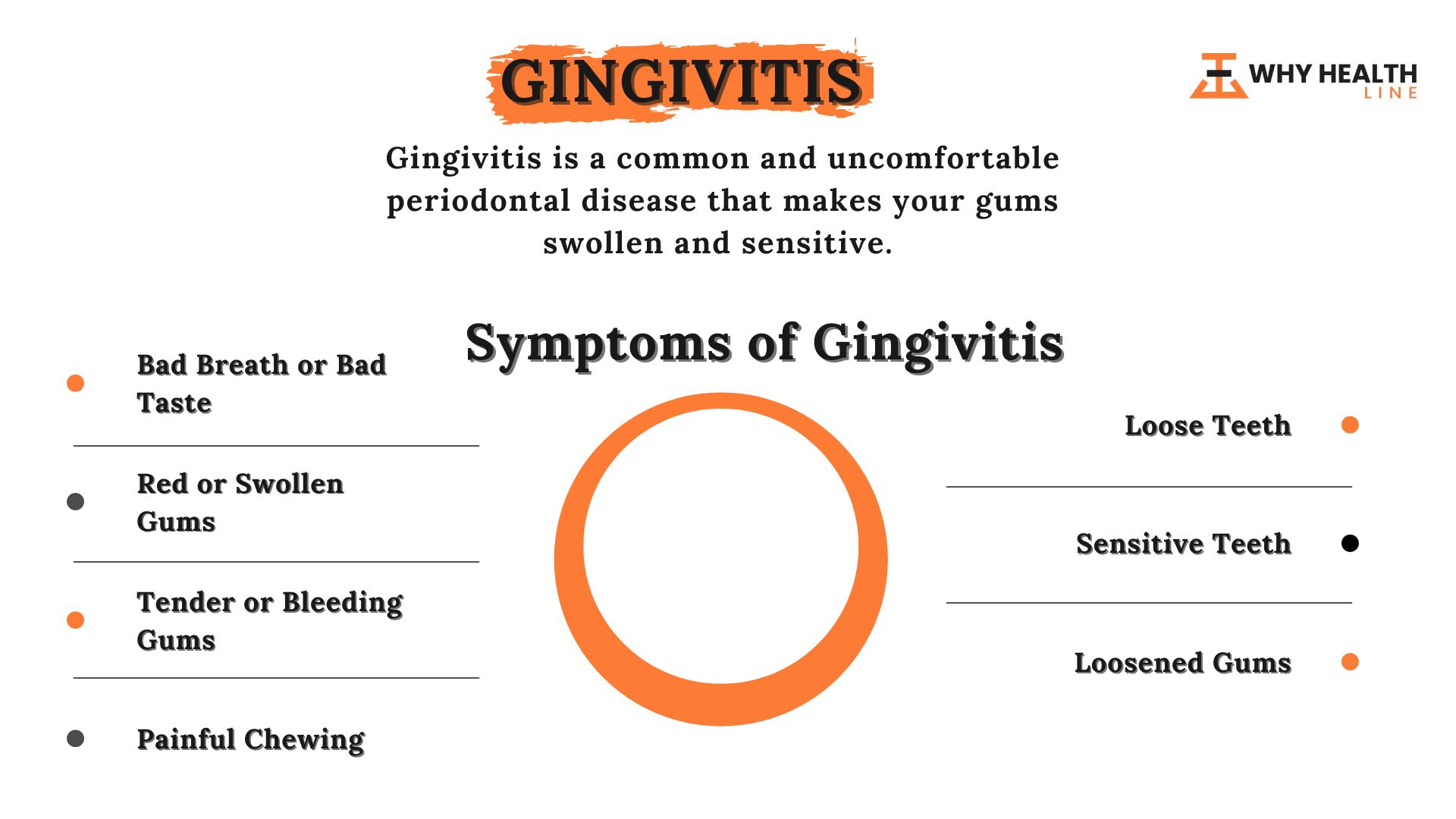
Introduction
Gingivitis is a common and uncomfortable periodontal disease that makes your gums swollen and sensitive. If not treated at the right time, it can even advance to periodontitis and ultimately result in tooth loss.
It can affect people belonging to any age group who have poor oral hygiene routines. Fortunately, it is a curable oral condition, specifically when addressed in the earlier stages.
In this article, you will learn if gingivitis is contagious and how you can maintain good oral health to avoid the development or spread of this gum disease.
It is the first stage of gum disease that usually occurs due to the build-up of plaque and bacteria on our teeth and causes infection.
Symptoms of Gingivitis
Common symptoms of this gum disease are:
- Bad breath or bad taste.
- Red or swollen gums.
- Tender or bleeding gums.
- Painful chewing.
- Loose teeth.
- Sensitive teeth.
- Loosened gums.
There are various gingivitis treatments at home that you can opt for, including regular dental cleanings and improved oral hygiene routines.

Five Effective Gingivitis Home Remedies
To prevent the spread of gum diseases, people should try to treat the symptoms of gingivitis as soon as they notice them.
There are various home remedies for gingivitis that you can choose depending on your oral condition and preferences:
1. Saltwater Rinse
A saltwater rinse is one of the most effective home remedies for gingivitis that help fight off the bacteria build-up in your mouth. You can rinse your mouth with salt water at home every day. To do this, simply mix a teaspoon of salt water into a glass of warm water.
Do not swallow it; instead, gently rinse the water around your mouth for 15 to 30 seconds. After that, spit the water out and try to repeat this process at least 2 to 3 times a day.
2. Baking Soda
Baking soda is regarded as another effective gingivitis treatment at home. It can help soften and remove dental plaque.
The most effective way is to blend baking soda with water to make a dentifrice or paste. With the help of this paste, you can naturally reverse gum diseases at home.
3. Oil Pulling
Oil pulling has been proven to be a credible method for eliminating bacterial formation and combating plaque-induced gingivitis. It harbors the growth of bacteria, which becomes a reason for gingivitis.
To do oil pulling, squish one teaspoon of oil in your mouth and swirl it around the mouth for up to 20 to 30 minutes.
It is generally quite difficult to keep oil in the mouth for this amount of time; therefore, you can try shorter lengths of time in the initiation.
Oils that people can use for this treatment typically include coconut oil, sesame oil, and Arimedadi oil.
4. Turmeric Gel Application
Turmeric gel is another method to prevent plaque and gingivitis because of its anti-inflammatory properties.
Turmeric is also antifungal and antimicrobial that can help to treat tender, red, and bleeding gums. People can also use curcumin gel as a treatment for gingivitis.
Curcumin is the active ingredient in turmeric. However, people allergic to turmeric should prevent this home remedy.
To apply turmeric gel:
- Brush your teeth.
- Rinse thoroughly.
- Apply the gel to your gums.
- Let the gel sit for 10 to 12 minutes.
- Swish water around your mouth.
- Spit the water out.
- Repeat at least two times a day.
5. Green Tea
Green tea is a common drink used all around the globe. Drinking unsweetened green tea might prove to be an easy and practical method for preventing gingivitis. You can also use green tea-based mouthwashes for the prevention and treatment of gingivitis.
Green tea chewing gums can also help reduce plaque inflammation. In addition to that, supplementing with green tea extract might also prove beneficial for your periodontal health.
Professional Gingivitis Treatment and Preventions
Professional gingivitis treatments usually include professional dental cleanings, scaling and root planing, tooth polishing, and debridement.
- Scaling and Root Planing: This is a type of oral cleaning that reaches deeper below the gum line and is used to treat various gum diseases. Scaling effectively helps remove plaque and tartar accumulation. Whereas planing smooths the surfaces of your teeth roots in order to prevent bacteria re-formation.
- Dental Cleanings: In this process, your dental professional will clean and remove all traces of plaque, tartar, and bacterial products. This will help you prevent various types of oral diseases, including gingivitis, in the initial stages.
- Dental Restoration: Bacteria usually accumulate in the crevices between our teeth. Therefore, if needed, dentists can fix or remove fillings, crowns, or bridges that stick out or do not fit appropriately.
In addition to that, misaligned teeth are also difficult to clean and may irritate your gums or make it harder to remove bacteria during daily oral care.
Therefore, dental professionals also offer various treatments to align the improperly positioned teeth to reduce the likelihood of gum diseases.
In general, it usually gets cleared up after a thorough professional cleaning as long as people continue good oral hygiene at home.
FAQs:
Is Gingivitis Contagious?
Unfortunately, it has been technically proven to be contagious. The bacteria that cause gingivitis can be transferred from one person to another through saliva-to-saliva contact.
If someone has gingivitis, he can expose others to that bacterium by sharing drinks, toothbrushes, and utensils.
How To Cure Gingivitis?
Here are some tips to cure gingivitis and prevent the re-infection:
- Brush your teeth twice a day with the help of a soft-bristled toothbrush.
- Do not forget to floss your teeth daily, as plaque usually hides in between teeth where toothbrush bristles cannot reach.
- Use a fluoride-based mouthwash.
- Do not skip dental appointments.
- Limit the intake of sugary foods and drinks.